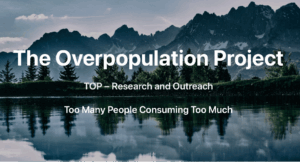Some words carry baggage, which may interfere with their utility, and even with their use. “Population” and “overpopulation” are examples of this vilification.
For years people concerned about the human effects on our environment have avoided using the word “overpopulation”. Is it time to end that taboo?
This word implies that there are too many people, and that we are injuring our environment. Thus, it is critical of humanity. To some, the word also recalls past histories of abuse, genocide and racism.
How many people does it take to be overpopulated? Thirty years ago, Professor Joel Cohen wrote the book “How Many People Can the Earth Support”. The answer to the title’s question is, “it depends”—in part it depends on our lifestyle. Cohen found a wide range, the maximum human population ranges from fewer than one billion to over 1000 billion people.
Here is a typical definition of “overpopulation”: “…when there are more people than can live on the earth in comfort, happiness, and health and still leave the world a fit place for future generations.” That definition looks at our use of limited resources, but it only considers the effect of too many people on our own species. What about the rest of the living world?
Philosophy professor Phil Cafaro suggests a new definition that considers the impacts both on humans and on the rest of life. In the abstract of a recent paper, he wrote:
“Human societies, or the world as a whole, are overpopulated when their populations are too large to preserve the ecosystem services necessary for future people’s wellbeing or to share the landscape fairly with other species.”
What is unique about this definition is that it includes harm to other flora and fauna, as well as to our own species.
My favorite way to measure human’s effect on the natural world is with the Ecological Footprint (EF). An individual’s EF is a measure of the demands made by a person on natural resources, using the areas of biologically productive land and water as its yardstick. Overall impact increases with increasing population, of course, and also increases with increasing consumption.
The planet can support more people if their consumption is low. For example, Kenya, a low-income country, has an average EF of 2 acres per person, versus the USA with over 20 acres. Currently, the global average EF of an individual is almost 7 acres.
Unfortunately, there is only enough productive land and water for each person to draw from 4 acres, on the average. Thus, using the Ecological Footprint as a measure, the planet is already overpopulated. Indeed, we are overpopulated by a whopping 75%! If, however, we all consumed as little as Kenyans, we would be fine.
Regrettably, there are not many people who want to decrease their consumption. Still fewer actually make the sacrifices necessary to consume less. Instead, many millions are trying to increase their income so they can consume more.
On the other hand, there is a long history of people aspiring to limit their fertility. For centuries women have tried to have control over their family size. All too many have risked death to abort unintended pregnancies. Now that effective contraception and safe abortion methods are available, the fertility rate is decreasing in most parts of the world. Sadly, the latest estimate is that over 250 million women want to avoid pregnancy but are not using modern, effective contraception. The “low hanging fruit” to approaching sustainability is to remove barriers to family planning.
Let’s accept that we are overpopulated, and start using that word fearlessly. I suggest that you explore The Overpopulation Project (https://overpopulation-project.com). You will find useful information about the relationship between human numbers and ecological sustainability.
©Richard Grossman MD, 2025

